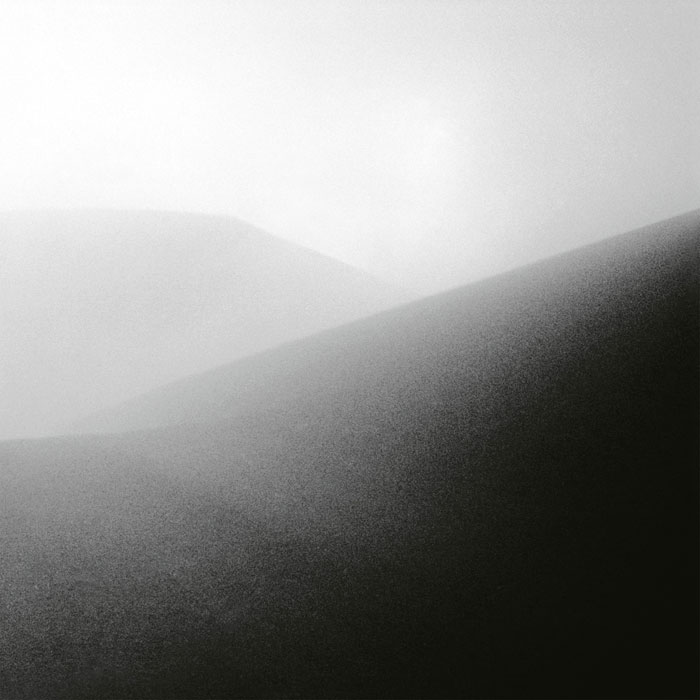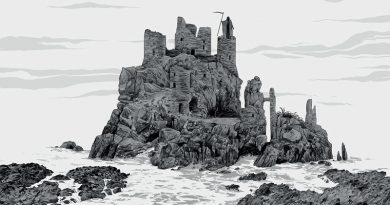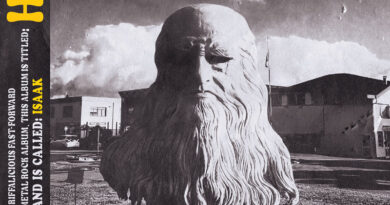Review: The Devil’s Trade ‘Vidékek Vannak Idebenn’
The most striking thing about the dark Hungarian doom/folk band, for me, is Dávid Makó’s voice. Over a traditional musical backdrop that has incorporated guitar, banjo, jug and even spoons, he has carved out three albums that have travelled a path of an increasingly heavyweight trajectory creating a suffocatingly emotive journey with lyrics such as ‘And if I die before you/I will be there/Waiting for you/To clean your path’ from 2020’s The Iron Peak.

That release concluded a process that left him with no more paths to travel and he sought fresh inspiration to continue the journey that saw him step away from his metal roots in Stereochrist and embrace downbeat, Appalachian-influenced folk. Fourth album Vidékek vannak idebenn (loosely translated ’There Are Landscapes Within’) sees him expanding the universe of The Devil’s Trade by adding keyboards and drums courtesy of Gáspár Binder to add a sonic depth which attempts to shake off the ‘frustrated, sort of paralysed state of floating’ whilst retaining the gut-wrenching melodies that he has built his reputation on.
The notion of transition weighs heavy on this latest record and was no doubt informed by the stunning Roadburn performance from 2022 where he was joined by techno terrorists John Cxnnor. Whereas The Call Of The Iron Peak was a stripped-down affair, carried by the minimalism in the melodies and words crafted around the despairing void, in that performance he was an island of focused raw feelings as the electronic cacophony and beats dropped around the pleading sorrow like it was raining breeze blocks.
Vidékek Vannak Idebenn does not deviate massively from the previous blueprint but does benefit from the swelling atmosphere and variety added by the additional instruments providing contrast to the stark, troubled spirit that Makó lays bare and channels into his work.
Opening with Felkelék én (which Google Translate tells me is Uprising Me) over the building, swirling synths and feedback that deep resonant voice singing in his native tongue (the first of four tracks to do so) gives an ominous scene setting feeling that this is moving towards something. Stark and immediately severing you from comfort, it seems that this new path for The Devil’s Trade is equally as wrought as the past and the upbeat flavouring in tracks like I’ll Be Your Dawn from 2014’s Those Miles We Walked Alone is long gone.
The lead track, Flashing Through A Lack of Light, sees the live drumming come into play early giving the album a more warmer and rounded sound that was held off until the end on The Call Of The Iron Peak. When Makó sings it is a tender, smokey whisper in English, echoing with multi-layered vocals that swell and tease out the chorus. If you close your eyes, you drift away into the hook as the imagery clasps you in the moment. This feels less dissonant than some of the previous moments, but still strikes the chords as the music matches the tone of the powerful lyrics.
there is an incredible depth of beauty in the bleak heart laid bare…
The title track, Vidékek vannak idebenn, features spine-tingling guitar and vocals in Hungarian which once again shows the power of music as a tool that transcends language, while the track drips with feeling. Honestly, I don’t know what he is saying but I do know how it makes me feel. Almost creeping in pace and tone, like some of Nine Inch Nails’ more sinister works, the tension cranks to the glorious moment that the heavier instruments crash in and make the track as heavy sonically as it is emotionally.
After the tumultuous climax, the delicately picked medley of Clear Like The Wind switches back to English as the vocals plead with fragility asking ‘why can’t we stay still? why can’t we hold our peace?’. The soft, tender track feels stripped bare, built around the guitar work with raw finger scratches on the strings and no drums. The lamenting, haunting nature of the words invokes a stillness and a focus that remains intense, despite the muted nature of the piece.
Liminal, the inspirational word for the album, continues in English with the clanking guitars joined by the thump of the drums and the deep bass stabs, over which the vocals soar. The stop/start dynamic builds and builds until the moment when Makó really lets his voice fly. The trapped frustration is weaved through the imagery and anguished statements like ‘I’ve made it this far’. As the track progresses, the vocals echo before the heavy crash of the turbulent ending mirroring the increased gravity of the sentiments expressed.
Fordulj kedves lovam (Turn My Dear Horse?) also conveys its wrought emotion through the ebb and flow of the music, complete with choral effects adding texture to the dense atmosphere and the banjo strains of All Kings Must Fail centres around a simple repeating refrain that is almost mantra-like, interlaced with that pleading desperation that is one of The Devil’s Trade’s most stunning elements.
The final track, Új hajnal már nem jő (A New Dawn Is No Longer Coming) appears on the Roadburn Live album as Lullaby. Here it is stripped of the oppressive backing electronica, replaced in moments by a ringing guitar and the funeral stamp of drums before pulling back to leave Makó in his native tongue. He once more demonstrates an ability to reach across the void and into your soul with the power and timbre of his delivery, it is also fitting that the album ends with just his haunting isolated acapella.
The Devil’s Trade are one of my most cherished musical discoveries of recent times. The sheer oppressive nature of Makó’s work may be too much for some, such is the challenging nature of the anguish that he channels. One thing for certain, there is an incredible depth of beauty in the bleak heart laid bare in the core of these records that is at once devastating and yet somehow cathartic.
Label: Season Of Mist
Band Links: Facebook | Bandcamp | Instagram
Scribed by: Mark Hunt-Bryden



